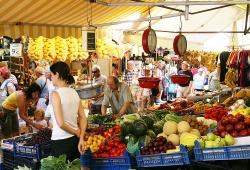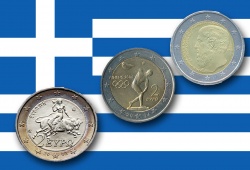What is Greece Rich in?
Greece, a country located in southeastern Europe, is known for its rich history, stunning landscapes, and vibrant culture. However, Greece's wealth extends beyond its cultural heritage and natural beauty. The country is also blessed with a plethora of valuable resources that have played a significant role in shaping its economy and history. From ancient times to the present day, Greece has been rich in various resources, including minerals, agricultural products, tourism, and human capital. In this article, we will delve into each of these areas to understand what makes Greece truly rich.
Mineral Resources
Greece boasts a diverse range of mineral resources that have been exploited for centuries. One of the most notable minerals found in Greece is bauxite, which is the primary source of aluminum. The country holds significant reserves of bauxite, particularly in the regions of Central Greece and the island of Milos. Additionally, Greece is rich in lignite, a type of coal used for power generation. The Ptolemais and Megalopolis regions are home to large lignite deposits, making Greece self-sufficient in terms of energy production.
Furthermore, Greece possesses substantial deposits of industrial minerals such as magnesite, bentonite, and perlite. Magnesite, found primarily in the region of Thessaly, is a crucial raw material for the production of refractory bricks and other heat-resistant products. Bentonite, abundant in the islands of Milos and Kimolos, is widely used in various industries, including drilling fluids and foundry molds. Lastly, perlite, mainly found on the island of Milos, is utilized in construction materials and horticulture.
Agricultural Products
Greece's fertile soil and favorable climate contribute to its abundance of agricultural products. The country is renowned for its high-quality olive oil production, ranking among the top olive oil producers worldwide. The region of Peloponnese, in particular, is known for its olive groves that yield exceptional olive oil varieties. Greece also produces a wide range of fruits, including grapes, oranges, peaches, and cherries. These fruits are not only consumed domestically but are also exported to various countries.
Moreover, Greece is rich in dairy products, with a strong tradition of sheep and goat farming. Feta cheese, a staple in Greek cuisine, is made from sheep's milk and is recognized as a Protected Designation of Origin (PDO) product. The country's mountainous regions provide ideal conditions for livestock farming, allowing Greece to produce high-quality dairy products.
Tourism
Tourism plays a vital role in Greece's economy, contributing significantly to its wealth. The country's rich history and archaeological sites attract millions of visitors each year. From the iconic Acropolis in Athens to the ancient ruins of Delphi and Olympia, Greece offers a treasure trove of historical landmarks. The picturesque Greek islands, such as Santorini, Mykonos, and Crete, entice tourists with their stunning beaches, charming villages, and vibrant nightlife.
Furthermore, Greece's natural beauty extends beyond its islands. The mainland boasts breathtaking landscapes, including the majestic Mount Olympus, the dramatic Meteora monasteries perched on towering rock formations, and the stunning Vikos Gorge in the region of Epirus. These natural wonders attract nature enthusiasts and adventure seekers from around the world.
Human Capital
Greece's most valuable resource is its people. The country is rich in human capital, with a highly educated workforce and a strong emphasis on education. Greek universities are renowned for their academic excellence and have produced numerous scholars and intellectuals throughout history. The country's emphasis on education has resulted in a skilled labor force that contributes to various sectors of the economy, including technology, research, and entrepreneurship.
Additionally, Greece's cultural heritage and artistic traditions have fostered a vibrant creative industry. Greek artists, musicians, and filmmakers have gained international recognition for their talent and creativity. The country's rich cultural heritage also attracts artists and scholars from around the world, contributing to a diverse and dynamic cultural scene.
Conclusion
In conclusion, Greece's wealth extends far beyond its cultural heritage and natural beauty. The country is rich in mineral resources, including bauxite, lignite, magnesite, bentonite, and perlite. Its fertile soil and favorable climate contribute to the production of high-quality agricultural products such as olive oil, fruits, and dairy. Tourism plays a vital role in Greece's economy, attracting visitors with its historical landmarks and stunning landscapes. Lastly, Greece's most valuable resource is its people, with a highly educated workforce and a vibrant creative industry. All these factors combined make Greece truly rich in diverse resources that have shaped its economy and history throughout the ages.








